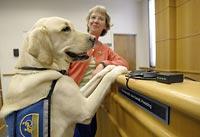Dogs lend comfort to kids in court

Here's something you don't see often in the King County Courthouse or Juvenile Detention Center: people breaking into smiles and reaching out eagerly for hugs when members of the Prosecutor's Office walk into the room.
That's what happens when two specially trained service dogs — Jeeter, a moonlighter, and Ellie, a full-timer — cruise the hallways or waiting rooms, enter a courtroom or visit with victims during what can be a traumatic interview process.
The two have been part of drug-court graduation ceremonies, have eased the tension in dozens of corridors and courtrooms, and helped scores of victimized children talk with prosecutors, interviewers and investigators about what had happened to them.
"They just make the time go by easier," said a 15-year-old who knows Jeeter and Ellie from his days at Drug Court.
"They've totally made a difference," said Elaine Deines, coordinator for King County Chief Juvenile Judge Patricia Clark.
"These dogs walk in and you can see everybody melt. They're so comforting and accepting. They don't want anything from you and you don't have to worry what they think."
Five months ago, Ellie, a 2-year-old Labrador-retriever mix trained by the nonprofit Canine Companions for Independence, became one of the nation's first service dogs to be officially matched with a prosecutor's office or any other governmental agency.
Ellie's placement in December was inspired by the success of Jeeter, the 3-½-year-old companion of a prosecutor's family member, who began to make weekly but unofficial courthouse visits nearly two years ago.
Two young victims wrote a book about Ellie. Jeeter has been allowed in a courtroom during a trial when two young twin girls refused to testify without his presence.
"It's hard to explain," said the twins' mother. "He just had a tenderness about him that helped them find the strength they needed to tell the story they couldn't.
"While we were waiting in the hall to testify, he approached the girls and places his head on their laps. He knew they needed him then."
Page Ulrey, a Special Assault Unit prosecutor who gives Ellie a home and is one of her co-handlers at work, said, "Ellie and Jeeter are really just about unconditional love."
Ellie's duties include nuzzling, cuddling, doing tricks, looking kind and lovingly placing her head on the laps of little ones.
"It can be very, very hard to come in here and talk about what happened," said Christine Liebsack, the child interviewer with the prosecutor's Special Assault Unit who uses the dogs most in her work.
"There are definitely kids who do not want to be here, and the dogs can help to break the ice or minimize the trauma," Liebsack said. "It makes me feel good when I can tell Ellie's providing some emotional comfort for them that I can't."
The program started nearly two years ago when Ellen O'Neill-Stephens, a deputy prosecutor, brought her son's service dog to the Juvenile Detention Center and the Drug Court where she was working.
Jeeter, who, like Ellie, is a Labrador-retriever mix trained by Canine Companions for Independence, was such a natural at befriending the young and the troubled that word of his abilities spread.
Last fall, a prosecutor asked for Jeeter's help with the 8-year-old twins who were hesitant to testify in a sex-abuse case, and the success of that story led O'Neill-Stephens to lobby for the dog's formal placement with the Prosecutor's Office to help victims.
Around the same time, O'Neill-Stephens learned Ulrey was looking for a dog of her own. The two of them, and Liebsack, researched, lobbied, then began the lengthy dog-companion-training process for Ellie.
The idea was a hard sell at first to the bosses at the Prosecutor's Office and at Canine Companions for Independence, where staff members feared their dogs' special skills would be underused.
But the success stories, and the love, are hard to argue with.
The mother of the twin girls who needed Jeeter's help to testify said the dog was so important in their lives that they decided to raise a service dog for someone else.
"What he gave us is priceless," she said.
In an article in a Children's Response Center newsletter, King County Prosecuting Attorney Norm Maleng talks about his initial reluctance to "hire" a dog.
"When I was a boy on the farm, our dogs lived in the barn. I could never imagine taking a dog into a courthouse," Maleng is quoted as saying. "Now after meeting Ellie and Ellen's dog Jeeter, I think that no Prosecutor's Office is complete without one."
Christine Clarridge: 206-464-8983 or cclarridge@seattletimes.com
